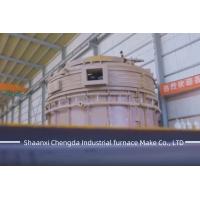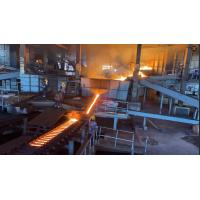| Sign In | Join Free | My himfr.com |
|
| Sign In | Join Free | My himfr.com |
|
| Ask Lasest Price | |
| Brand Name : | Shaanxi Chengda |
| Model Number : | Negotiate based on equipment processing capacity |
| Certification : | ISO9001 |
| Price : | The price will be negotiated based on the technical requirements and supply scope of Party A |
| Payment Terms : | L/C,D/A,D/P,T/T,Western Union,MoneyGram |
| Supply Ability : | Complete production supply chain, supply on time, and meet quality standards |
| Delivery Time : | 2~3 months |
The main types of tailings electric furnaces in the smelting industry include electric arc furnaces, submerged arc furnaces, etc. The following is a detailed introduction to them:
Electric arc furnace:
Working principle: Utilizing the high temperature generated by the
arc between the electrode and the furnace material to melt and
smelt tailings materials. When current passes through the
electrode, an arc is formed between the electrode end and the
furnace charge, and the high temperature generated by the arc can
reach over 3000 ℃, causing the furnace charge to quickly melt and
undergo chemical reactions.
Characteristics: Electric arc furnaces have the advantages of fast heating speed, precise temperature control, and easy adjustment of furnace atmosphere. They can adapt to the smelting needs of different types of tailings and produce high-quality metal products. At the same time, the automation level of electric arc furnaces is relatively high, and the production process is easy to achieve mechanization and automation, which can effectively improve production efficiency and product quality, and reduce labor intensity. However, electric arc furnaces consume a large amount of electricity and have a significant impact on the power grid, requiring corresponding reactive power compensation devices and voltage stabilizers.
Submerged arc furnace:
Working principle: also known as electric arc furnace or resistance
electric furnace, mainly used for reducing and smelting ores,
carbonaceous reducing agents, solvents and other raw materials. It
uses carbon or magnesium refractory materials as furnace lining,
uses self baking electrodes, and inserts the electrodes into the
furnace material for submerged arc operation. It uses the energy of
the arc and the energy generated by the resistance of the furnace
material when the current passes through the furnace material to
melt the metal.
Features: The ore blast furnace has the advantages of high production capacity, low energy consumption, and stable product quality, and is suitable for large-scale production of ferroalloys, calcium carbide, and other products. It can process various types of tailings resources, extract valuable metals from them, and achieve resource recycling and utilization. In addition, the operating cost of the mineral thermal furnace is relatively low, the production process is relatively stable, and it is easy to achieve automation control. However, the investment in mineral thermal furnaces is relatively large, the construction period is long, and the requirements for the quality and particle size of raw materials are high.

|



